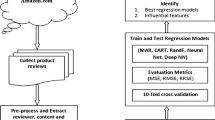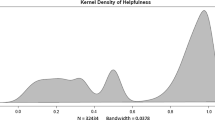Abstract
The proliferation in the number of available online reviews provides an excellent opportunity to use this accumulated enormous information of any product in a more strategic way to improve the quality of the product and services of the e-commerce company. Due to the non-uniform quality of online reviews, it is crucial to identify those helpful reviews from the pile of a large amount of low quality and low informative other reviews. This system will help the customers to form an unbiased opinion quickly by looking at its level of helpfulness. The e-commerce companies measure the helpfulness of a review using the number of votes it gets from other customers. This situation arises problems to newly-authored potentially helpful reviews due to lack of votes. Thus it is essential to have an automated process to estimate and predict helpfulness of any review. This paper identifies the essential characteristics of online reviews influencing the helpfulness of it. This study categorized all characteristics of reviews collected from previous literature in four main categories and then study the combined effect of the four aspects in predicting the helpfulness of a review. The product type (Search or Experience) acts as a control variable in the factors identification model of helpful prediction of a review. An analysis of total 14782 reviews from Amazon.com across five different product category shows the factors influencing the helpfulness of a review varies across product categories. Then a comparative study of two widely used machine learning, Artificial Neural Network and Multiple Adaptive Regression Spline are presented to predict the helpfulness of online review across five different categories and a better method of predicting helpfulness of online reviews are suggested based on the type of product. This study solves the starvation problem of potential newly-authored or infamous reviews without any manual votes along with high accuracy of helpfulness prediction.
Access this chapter
Tax calculation will be finalised at checkout
Purchases are for personal use only
Similar content being viewed by others
References
Chevalier, J.A., Mayzlin, D.: The effect of word of mouth on sales: online book reviews. J. Mark. Res. 43, 345–354 (2006)
Forman, C., Ghose, A., Wiesenfeld, B.: Examining the relationship between reviews and sales: the role of reviewer identity disclosure in electronic markets. Inf. Syst. Res. 19, 291–313 (2008)
Ghose, A., Ipeirotis, P.G.: Estimating the helpfulness and economic impact of product reviews: mining text and reviewer characteristics. IEEE Trans. Knowl. Data Eng. 23, 1498–1512 (2011)
Hu, Y.H., Chen, K.: Predicting hotel review helpfulness: the impact of review visibility, and interaction between hotel stars and review ratings. Int. J. Inf. Manag. 36, 929–944 (2016)
Hu, N., Koh, N.S., Reddy, S.K.: Ratings lead you to the product, reviews help you clinch it? The mediating role of online review sentiments on product sales. Decis. Support Syst. 57, 42–53 (2014)
McAuley, J., Targett, C., Shi, Q., van den Hengel, A.: Image-based recommendations on styles and substitutes. In: SIGIR (2015)
Kacewicz, E., Pennebaker, J.W., Davis, M., Jeon, M., Graesser, A.C.: Pronoun use reflects standings in social hierarchies. J. Lang. Soc. Psychol. 33, 125–143 (2013)
Khashei, M., Bijari, M.: An artificial neural network (p, d, q) model for time series forecasting. Expert Syst. Appl. 37(1), 479–489 (2010)
Kim, S.M., Pantel, P., Chklovski, T., Pennacchiotti, M.: Automatically assessing review helpfulness. In: Proceedings of the 2006 Conference on Empirical Methods in Natural Language Processing, Sydney, Australia, 22–23 July 2006, pp. 423–430 (2006)
Korfiatis, N., Garcia-Bariocanal, E., Sanchez-Alonso, S.: Evaluating content quality, and helpfulness of online product reviews: the interplay of review helpfulness vs. review content. Electron. Commer. Res. Appl. 11, 205–217 (2012)
Krishnamoorthy, S.: Linguistic features for review helpfulness prediction. Expert Syst. Appl. 42, 3751–3759 (2015)
Kuan, K.K., Hui, K.L., Prasarnphanich, P., Lai, H.Y.: What makes a review voted? An empirical investigation of review voting in online review systems. J. Assoc. Inf. Syst. 16, 48–71 (2015)
Kumar, N., Benbasat, I.: The influence of recommendations on consumer reviews on evaluations of websites. Inf. Syst. Res. 17(4), 425–439 (2006)
Kursa, M., Rudnicki, W.: Feature selection with the Boruta package. J. Stat. Softw. 36(11), 1–13. http://dx.doi.org/10.18637/jss.v036.i11
Lee, S., Choeh, J.Y.: Predicting the helpfulness of online reviews using multilayer perceptron neural networks. Expert Syst. Appl. 41(6), 3041–3046 (2014)
McAuley, J., Leskovec, J.: Hidden factors and hidden topics: understanding rating dimensions with review text. In: Proceedings of the 7th ACM Conference on Recommender Systems, RecSys’, Hong Kong, China, 12–16 October 2013, pp. 165–172 (2013)
Mudambi, S.M., Schuff, D.: What makes a helpful online review? A study of customer reviews on Amazon.com. MIS Q. 34, 185–200 (2010)
Nelson, P.: Information and consumer behavior. J. Polit. Econ. 78(20), 311–329 (1970)
Nelson, P.: Advertising as information. J. Polit. Econ. 81(4), 729–754 (1974)
Newman, M.L., Pennebaker, J.W., Berry, D.S., Richards, J.M.: Lying words: predicting deception from linguistic style. Pers. Soc. Psychol. Bull. 29, 665–675 (2003)
Pan, Y., Zhang, J.Q.: Born unequal: a study of the helpfulness of user-generated product reviews. J. Retail. 87, 598–612 (2011)
Pennebaker, J.W., Booth, R.J., Francis, M.E.: Linguistic inquiry and word count (LIWC2007), LIWC, Austin, TX, USA (2007). http://www.liwc.net. Accessed 27 Apr 2018
Pennebaker, J.W., Francis, M.E.: Cognitive, emotional, and language processes in disclosure. Cogn. Emot. 10, 601–626 (1996)
Pennebaker, J.W., Boyd, R.L., Jordan, K., Blackburn, K.: The development and psychometric properties of LIWC2015. http://hdl.handle.net/2152/31333. Accessed 27 Apr 2018
Pennebaker, J.W., Chung, C.K., Frazee, J., Lavergne, G.M., Beaver, D.I.: When small words foretell academic success: the case of college admissions essays. PLoS ONE 9, e115844 (2014)
Sen, S., Lerman, D.: Why are you telling me this? An examination into negative consumer reviews on the web. J. Interact. Mark. 21, 76–94 (2007)
Tausczik, Y.R., Pennebaker, J.W.: The psychological meaning of words: LIWC and computerized text analysis methods. J. Lang. Soc. Psychol. 29, 24–54 (2010)
Willemsen, L.M., Neijens, P.C., Bronner, F., De Ridder, J.A.: “Highly recommended!” The content characteristics and perceived usefulness of online consumer reviews. J. Comput. Mediat. Commun. 17, 19–38 (2011)
Yang, Y., Yan, Y., Qiu, M., Bao, F.: Semantic analysis and helpfulness prediction of text for online product reviews. In: Proceedings of the 53rd Annual Meeting of the Association for Computational Linguistics and the 7th International Joint Conference on Natural Language Processing, Beijing, China, 26–31 July 2015, pp. 38–44 (2015)
Yin, D., Bond, S., Zhang, H.: Anxious or angry? Effects of discrete emotions on the perceived helpfulness of online reviews. MIS Q. 38, 539–560 (2014)
Author information
Authors and Affiliations
Corresponding author
Editor information
Editors and Affiliations
Rights and permissions
Copyright information
© 2019 Springer Nature Switzerland AG
About this paper
Cite this paper
Dey, D., Kumar, P. (2019). A Novel Approach to Identify the Determinants of Online Review Helpfulness and Predict the Helpfulness Score Across Product Categories. In: Madria, S., Fournier-Viger, P., Chaudhary, S., Reddy, P. (eds) Big Data Analytics. BDA 2019. Lecture Notes in Computer Science(), vol 11932. Springer, Cham. https://doi.org/10.1007/978-3-030-37188-3_21
Download citation
DOI: https://doi.org/10.1007/978-3-030-37188-3_21
Published:
Publisher Name: Springer, Cham
Print ISBN: 978-3-030-37187-6
Online ISBN: 978-3-030-37188-3
eBook Packages: Computer ScienceComputer Science (R0)




